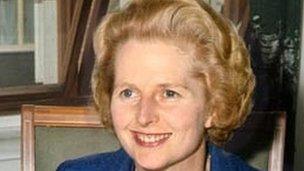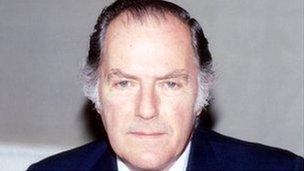Secret hunger strike documents released
- Published

Margaret Thatcher, later Baroness Thatcher, was implacably opposed to the hunger strikers
British officials set out to "butter up" the head of Ireland's Catholics, Cardinal Tomas O Fiaich, during the hunger strikes of 1981, recently-released confidential documents have revealed.
The suggestion to try to appease the cardinal came in a note accompanying a draft letter written by D Blatherwick of the Political Affairs Division on behalf of then Prime Minister Margaret Thatcher.
The Public Records Office documents are now available on the <link> <caption>Cain</caption> <url href="http://cain.ulst.ac.uk/cgi-bin/PRONI/pronidbase.pl?field=year&text=1981" platform="highweb"/> </link> website.
They give an intriguing insight into the public relations battle involving republicans, the Northern Ireland Office and the British and Irish governments during one of the most tense periods of the Troubles.
After hunger strikers Raymond McCreesh and Patsy O'Hara died on 21 May 1981, the then Primate, Cardinal O Fiaich, publicly criticised the government's attitude to the prison protest.
'Case for action'
Mr Blatherwick, in his message to Downing Street, wrote: "Your minute of 21 May asked me to think about a possible message to Cardinal O Fiaich. The Cardinal has since let loose another shaft (copy attached), which reinforces the case for action on our part.
"I submit a self-explanatory draft from the Prime Minister together with a draft covering letter to No 10. I have tried to bring out elements of reassurance for the Catholic community, and to butter up the Cardinal.
"I have not inserted the idea that the influence of the Church is the key to progress but it is latent in the concept of consulting the Cardinal anyway."
Referring to Cardinal O Fiaich's statement to the press, he said: "As the Cardinal says, the impasse over the hunger strike and the continuing deaths of hunger strikers have sharply raised the temperature in the Catholic community.

Humphrey Atkins was Secretary of State for Northern Ireland in 1981
"There is widespread genuine concern for the hunger strikers' fate (not necessarily for their cause) and a growing conviction, however illogical it may seem on the facts of the issue, that it is up to Government - as the stronger party - to find a way out of the dilemma which threatens to drag the community back into the dark days of the early 1970s.
"The feelings of bitterness, despair and frustration which show through the Cardinal's statement are therefore widely shared. At the same time, there is some feeling in the minority that the Government has not taken enough notice of the Cardinal's appeals."
"The Secretary of State (Humphrey Atkins) therefore hopes that the Prime Minister will agree to respond to the Cardinal's statement, and I enclose a draft.
"The timing of its release will be important. We think that the maximum impact would be made if it were to go to the Cardinal, and the press, on Sunday evening 24 May, after the funerals of McCreesh and O'Hara."
Mr Blatherwick adds that he believes the government is holding its own in the publicity battle.
Conflict archive
"The ECHR (European Convention on Human Rights) intervention should help us hold the line, though it is not yet clear what publicity we shall be able to make of it in the circumstances," said.
The previously secret records have been added to the Conflict Archive on the INternet (CAIN) website as part of ongoing work between the University of Ulster and the Public Record Office of Northern Ireland (PRONI).
In October 2010 a selection of records for the years 1968 to 1979 was made available. This was made up of hundreds of government records, formerly classified as restricted or secret.
Dr Brendan Lynn, CAIN deputy director Dr Brendan Lynn said: "We are pleased to have been able to continue our cooperation with PRONI and to update the existing section with material dealing with the year 1981.
"The information is easily available and free of charge. We believe it will of great use to students, researchers, teachers and lecturers or to anyone with an interest in the political and social history of Northern Ireland."